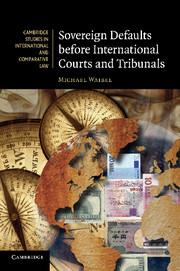Book contents
- Frontmatter
- Contents
- Preface
- Note: measuring sovereign liability over time
- Table of cases
- Table of treaties
- List of abbreviations
- Part I Sovereign defaults across time
- 1 Sovereign debt crises and defaults
- 2 Political responses to sovereign defaults
- 3 Quasi-receivership of highly indebted countries
- 4 Monetary reform and sovereign debt
- 5 Financial necessity
- 6 National settlement institutions
- 7 State succession and the capacity to pay
- 8 Arbitration clauses in sovereign debt instruments
- 9 Creditor protection in international law
- Part II The future role of arbitration on sovereign debt
- Bibliography
- Index
- Cambridge Studies in International and Comparative Law
8 - Arbitration clauses in sovereign debt instruments
Published online by Cambridge University Press: 01 June 2011
- Frontmatter
- Contents
- Preface
- Note: measuring sovereign liability over time
- Table of cases
- Table of treaties
- List of abbreviations
- Part I Sovereign defaults across time
- 1 Sovereign debt crises and defaults
- 2 Political responses to sovereign defaults
- 3 Quasi-receivership of highly indebted countries
- 4 Monetary reform and sovereign debt
- 5 Financial necessity
- 6 National settlement institutions
- 7 State succession and the capacity to pay
- 8 Arbitration clauses in sovereign debt instruments
- 9 Creditor protection in international law
- Part II The future role of arbitration on sovereign debt
- Bibliography
- Index
- Cambridge Studies in International and Comparative Law
Summary
As long as absolute sovereign immunity closed national courts to sovereign creditors, arbitration rudimentarily filled the resulting gap in creditor protection. In the second half of the nineteenth century and prior to World War II, arbitration clauses in sovereign debt instruments were quite common. Once national courts started to hear sovereign debt cases, the need for such arbitration clauses declined. After World War II, these arbitration clauses became extremely rare.
Modern sovereign debt instruments almost invariably submit to the jurisdiction of national courts in important financial centres. Today's sovereign bonds rarely contain arbitration clauses. Brazilian government bonds, which occasionally incorporate UNCITRAL arbitration clauses, are the exception. They include arbitration clauses alongside providing for the jurisdiction of Brazilian courts because Brazilian law prohibits submission to external courts.
Arbitration clauses before the twentieth century
The Jay Treaty of 1794 created the first mixed claims commission to deal with Britain's claims regarding ‘[d]ebts … which were bona fide contracted before the Peace’. It stipulated arbitration to settle debts incurred before the American Revolution, maritime claims, and the Maine boundary dispute with Britain.
In the nineteenth century, arbitration clauses in sovereign debt contracts were quite common. A good example is Article 31 in the agreement to restructure Costa Rica's external debt in 1884. The debt restructuring of Entre Rios province likewise provided for arbitration on whether special types of claims had received adequate consideration, so as to avoid delaying the implementation of the agreement or risk non-acceptance. Lord Rothschild acted as sole arbitrator.
- Type
- Chapter
- Information
- Sovereign Defaults before International Courts and Tribunals , pp. 157 - 168Publisher: Cambridge University PressPrint publication year: 2011



